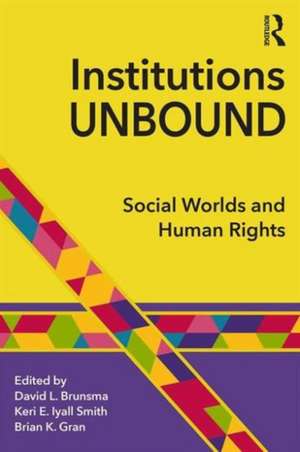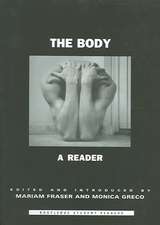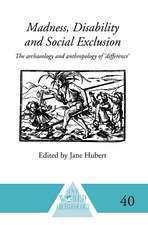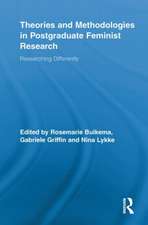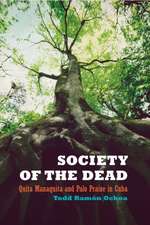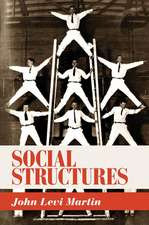Institutions Unbound: Social Worlds and Human Rights
Editat de David Brunsma, Keri Iyall Smith, Brian Granen Limba Engleză Paperback – 25 mar 2016
| Toate formatele și edițiile | Preț | Express |
|---|---|---|
| Paperback (1) | 349.71 lei 6-8 săpt. | |
| Taylor & Francis – 25 mar 2016 | 349.71 lei 6-8 săpt. | |
| Hardback (1) | 1108.37 lei 6-8 săpt. | |
| Taylor & Francis – 17 mar 2016 | 1108.37 lei 6-8 săpt. |
Preț: 349.71 lei
Nou
Puncte Express: 525
Preț estimativ în valută:
66.92€ • 72.92$ • 56.39£
66.92€ • 72.92$ • 56.39£
Carte tipărită la comandă
Livrare economică 23 aprilie-07 mai
Preluare comenzi: 021 569.72.76
Specificații
ISBN-13: 9781138655515
ISBN-10: 1138655511
Pagini: 216
Ilustrații: 2
Dimensiuni: 152 x 229 x 18 mm
Greutate: 0.29 kg
Ediția:1
Editura: Taylor & Francis
Colecția Routledge
Locul publicării:Oxford, United Kingdom
ISBN-10: 1138655511
Pagini: 216
Ilustrații: 2
Dimensiuni: 152 x 229 x 18 mm
Greutate: 0.29 kg
Ediția:1
Editura: Taylor & Francis
Colecția Routledge
Locul publicării:Oxford, United Kingdom
Public țintă
Postgraduate and UndergraduateCuprins
1 Medical Sociology
Susan W. Hinze and Heidi L. Taylor
2 Crime, Law, and Deviance
Joachim J. Savelsberg
3 Education
Nathalia E. Jaramillo, Peter McLaren, and Jean J. Ryoo
4 Family
Angela J. Hattery and Earl Smith
5 Organizations, Occupations, and Work
J. Kenneth Benson
6 Political Sociology
Thomas Janoski
7 Culture
Mark D. Jacobs and Lester R. Kurtz
8 Science, Knowledge, and Technology
Jennifer L. Croissant
9 Sociology of Law
Christopher N. J. Roberts
10 Religion
David V. Brewington
11 Economic Sociology
Clarence Y. H. Lo
Susan W. Hinze and Heidi L. Taylor
2 Crime, Law, and Deviance
Joachim J. Savelsberg
3 Education
Nathalia E. Jaramillo, Peter McLaren, and Jean J. Ryoo
4 Family
Angela J. Hattery and Earl Smith
5 Organizations, Occupations, and Work
J. Kenneth Benson
6 Political Sociology
Thomas Janoski
7 Culture
Mark D. Jacobs and Lester R. Kurtz
8 Science, Knowledge, and Technology
Jennifer L. Croissant
9 Sociology of Law
Christopher N. J. Roberts
10 Religion
David V. Brewington
11 Economic Sociology
Clarence Y. H. Lo
Notă biografică
David L. Brunsma is a Professor of Sociology at Virginia Tech and co-editor of The Leading Rogue State.
Keri E. Iyall Smith, Assistant Professor of Sociology at Suffolk University, is the author of States of Indigenous Movements.
Brian K. Gran is Associate Professor of Sociology and Law at Case Western Reserve University whose research focuses on actors and institutions that foster and obstruct human rights advancement. His publications have appeared in The International Journal of Children's Rights and in Child Welfare.
Keri E. Iyall Smith, Assistant Professor of Sociology at Suffolk University, is the author of States of Indigenous Movements.
Brian K. Gran is Associate Professor of Sociology and Law at Case Western Reserve University whose research focuses on actors and institutions that foster and obstruct human rights advancement. His publications have appeared in The International Journal of Children's Rights and in Child Welfare.
Descriere
Institutions--like education, family, medicine, culture, and law--are powerful social structures shaping how we live together. As members of society we daily express our adherence to norms and values of institutions as we consciously and unconsciously reject and challenge them. Our everyday experiences with institutions not only shape our connections with one another, they can reinforce our binding to the status quo as we struggle to produce social change. Institutions can help us do human rights. Institutions that bridge nation-states can offer resources, including norms, to advance human rights. These institutions can serve as touch stones to changing minds and confronting human rights violations. Institutions can also prevent us from doing human rights. We create institutions, but institutions can be difficult to change. Institutions can weaken, if not outright prevent, human rights establishment and implementation. To release human rights from their institutional bindings, sociologists must solve riddles of how institutions work and determine social life. This book is a step forward in identifying means by which we can loosen human rights from institutional constraints.
